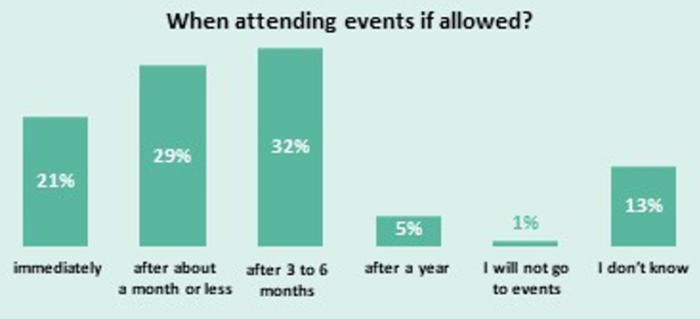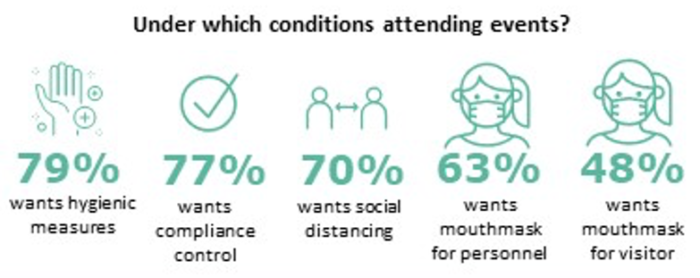After almost four months of the corona crisis, there is a great need to restart the sector. Not only for event organisers and suppliers: Belgians are also missing their events and are gradually getting ready to come together again. Everyone agrees that it must be safe. The centre of expertise Public Impact of KdG University of Applied Sciences and Arts figured out what that means. They surveyed both the event sector and the visitors of events in Belgium. Organisers are working hard to make their events as corona proof as possible and are even developing new types of events for this purpose. The visitors are aware of the need for measures and the necessary caution. But for many, this does not stand in the way of the pleasure of being together.
Belgium is an event country. Six out of ten Belgians who visited at least one event last year, miss they cannot go to events. One fifth of the visitors would go immediately when they are safely organised again. Within a month, that is already half. “But it is not the same for all events”, explains Jolien Vangeel, researcher at the centre of expertise Public Impact. “The data show that visitors would go more quickly to a wedding or a cultural event than to a fair.”

The visitors are confident, the sector is ready
Two out of three visitors are confident that the organisers will make their events as corona proof as possible. And this is rightly so: as many as seven out of ten organisers are creative in finding ways to organise their events as corona proof as possible. Joris Verhulst, researcher at the centre of expertise Public Impact, explains: “the data show a flexible sector that continues to adapt to a new reality in a creative and sustainable way. That creativity and flexibility is also needed to survive these difficult times. Many organisations are very active. Although it is worrying that four out of ten suppliers currently have no activities.”

Mouth masks as the new standard?

Who bears the cost? Visitors and organisers meet each other
Organisers are relieved with these figures. After all, income is needed. Joris Verhulst explains: “the event sector can and wants to live with a maximum of a third fewer visitors. Fewer visitors mean less income. Moreover, they expect 25% more costs to provide an average event. These include costs and investments to guarantee safety and hygiene.”
Event visitors are understanding. They are prepared to pay a little extra for a ticket, drinks and food to cover the costs of the extra safety measures. Five euros extra for a ticket of 25 euros, or 10 euros extra for a 100 euro ticket: these turn out to be reasonable price increases according to the visitors. At free events, one visitor in three also wants to pay more for drinks and food to help bear the costs. “Supply and demand at events will certainly meet this summer”, concludes Jolien Vangeel.
The surveys
Both the national sector survey and the national visitor survey were carried out in June. More than 12% of all event professionals in Belgium completed the sector survey. These organisations are for more than 50% of their turnover professionally involved or active in the organisation of events, conferences, fairs, festivals, incentives and/or meetings. The visitor survey was completed by 1,000 Belgians representative by gender, age, educational level, migration background and family size. 706 of these 1,000 Belgians indicated that they attended one or more events in 2019. The results are based on this group of 706 event visitors.
These surveys are part of a series of surveys carried out by the KdG centre of expertise in association with VISITFLANDERS, EventFlanders, the Alliance of Belgian Event Federations, FMiV and Experience Magazine. The aim is to monitor the impact of the corona crisis, now and in the future, both among the event professionals as among event visitors. After all, insight into the attitude of visitors towards events, their opinions and general feelings about the current and future situation also has a major public and sectoral impact.
